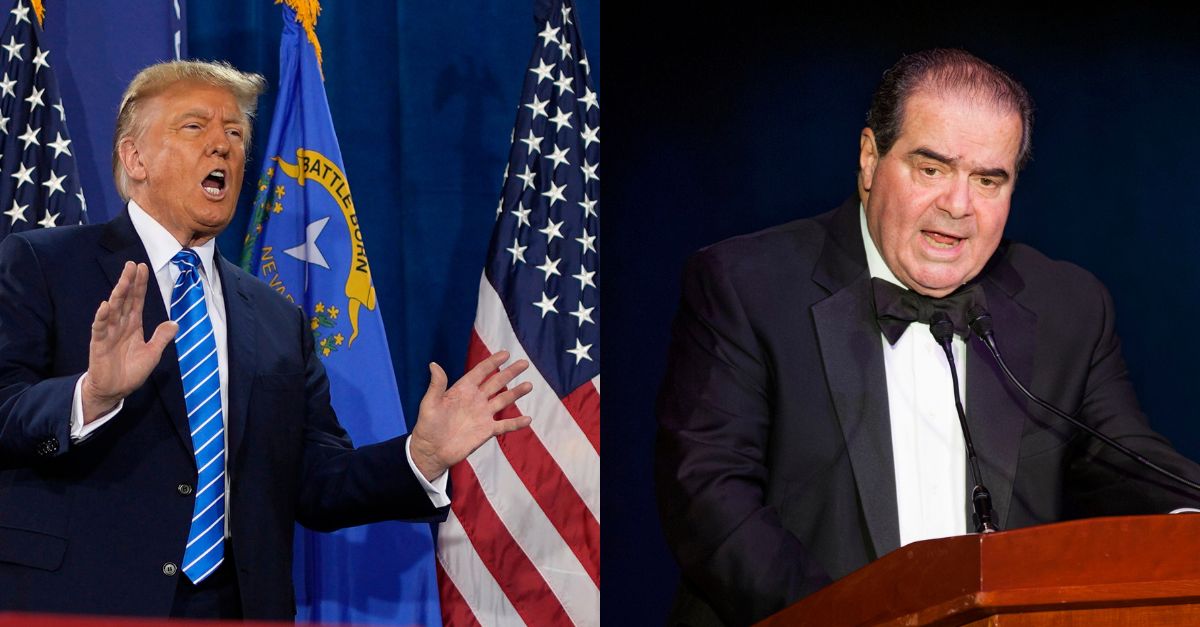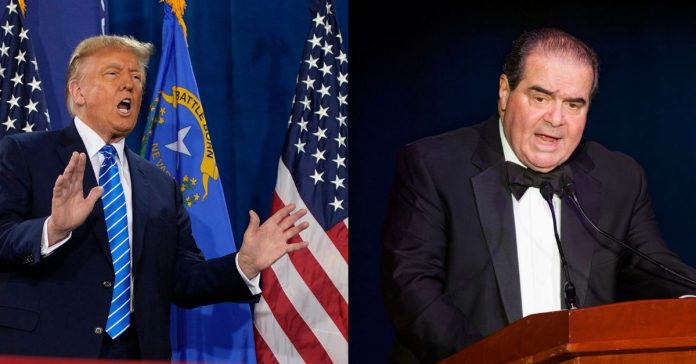
Left: Republican presidential candidate former President Donald Trump speaks at a campaign event on Saturday, Jan. 27, 2024, in Las Vegas. (AP Photo/John Locher)/ Right: In this Nov. 6, 2014, file photo Supreme Court Justice Antonin Scalia speaks in Washington. (AP Photo/Kevin Wolf)
Before he left the White House in 2020, Donald Trump proposed that a garden be built to honor those he dubbed “the greatest Americans to ever live” and on his list of honorees, he named the late U.S. Supreme Court Justice Antonin Scalia. The garden never came to fruition and as it has turned out in more recent days, that “greatest American” may end up aiding Trump’s disqualification on the ballot in the 2024 election.
Legal expert and journalist Roger Parloff at Lawfare published a comprehensive report on Jan. 24 exploring a significant letter and its history that goes to the heart of the lawsuits now spread out across the country seeking to disqualify — or defend — Trump’s eligibility on the ballot under Section III of the Constitution’s Fourteenth Amendment.
The provision bans those who “engaged” in insurrection and who previously took an oath to support the Constitution as an “officer of the United States,” from ever holding office again.
As Law&Crime has reported extensively, in December the Colorado Supreme Court found that under this criteria, Trump was disqualified. The state’s lower court had split the difference before that ruling, finding Trump did “engage” in insurrection on Jan. 6, 2021, but 2nd Judicial District Judge Sarah Wallace stopped short of declaring that Trump, as president, was defined as an “officer of the United States.”
A frenzied appeals process followed and with it, a national discourse and debate continued among scholars, lawyers, politicians, journalists, and voters alike. Now history is poised to be made when the U.S. Supreme Court will hear oral arguments weighing the nuances on Feb. 8.
In the meantime, Lawfare has noted that in a 2014 letter from the late Justice Antonin Scalia, Trump’s “American hero” appeared to have considered the president an “officer of the United States,” an assertion undercutting the heft of Trump’s defense against disqualification.
The Scalia letter was a result of a legal debate involving a Supreme Court case and, in short, interpretations of a quartet of clauses in the Constitution including the Appointments Clause, the Impeachment Clause, the Commissions Clause and the Article VI Oaths Clause.
Parloff wrote last week:
That year, the Supreme Court decided the case of National Labor Relations Board v. Noel Canning. There, the Court unanimously affirmed a challenge to the recess appointments of three NLRB commissioners. Scalia wrote a concurrence, in which Chief Justice John Roberts and Justices Clarence Thomas and Samuel Alito joined.
In it, Scalia wrote: “Except where the Constitution or a valid federal law provides otherwise, all ‘Officers of the United States’ must be appointed by the President ‘by and with the Advice and Consent of the Senate.’” (Italics added.)
This letter prompted two legal scholars, Seth Barrett Tillman of Maynooth University School of Law and Criminology in Ireland and Josh Blackman of South Texas College of Law, to write to Justice Scalia.
In sum, they asked for a clarification of his language since it did not align with their understanding of the Constitution’s Appointments Clause.
Scalia obliged them. And curtly.
“Dear Mr. Tillman: I meant exactly what I wrote. The manner by which the President and the Vice President hold their offices is ‘provide[d] otherwise’ by the Constitution. As is the manner by which the Speaker of the House and the President Pro Tempore of the Senate hold theirs,” Scalia wrote in 2014, adding nothing else but his signature.
A decade on, that letter has ultimately done little to persuade Tillman or Blackman from their position. They only recently filed an amicus brief supporting the position from Trump’s lawyers that he is not an officer of the United States, despite taking an oath when he assumed office.
The legal thicket is one both professors have trudged through for years, writing extensively on it and often to some controversy. That controversy only grows as the disqualification questions come to a head in court.
Lawfare noted there is increasing “highly persuasive empirical evidence” challenging what are key positions in the recent amicus brief. Linguists, legal analysts and researchers have mutually asserted that the crux of Tillman and Blackman’s arguments, and what are in their own way, Trump’s argument, rely on historically unsupported semantic distinctions.
Both professors have so far rejected attempts to unwind their reading of Section III and who is or is not defined as an “officer” of the United States under it.
But as Parloff noted, it is striking that Scalia did not seem to stand alone either. Long before him, it was the nation’s founding father Alexander Hamilton who seemed to illuminate the definition of “officer of the United States” in the Federalist Papers 67 as he weighed the Appointments Clause:
Hamilton writes “not otherwise provided for in the Constitution,” while the constitutional text actually reads “not herein otherwise provided for.” (Hamilton uses that exact same language — “not otherwise provided for in the Constitution” — inFederalist 69 andFederalist 76, too, Heilpern points out to me in an interview.) But Hamilton’s slip, if that’s what it was, suggests that he understood the two formulations to be absolutely equivalent. That would mean that Hamilton read the eight words in question exactly the way Scalia did in 2014. And exactly opposite from the way Blackman and Tillman do.
Have a tip we should know? [email protected]

